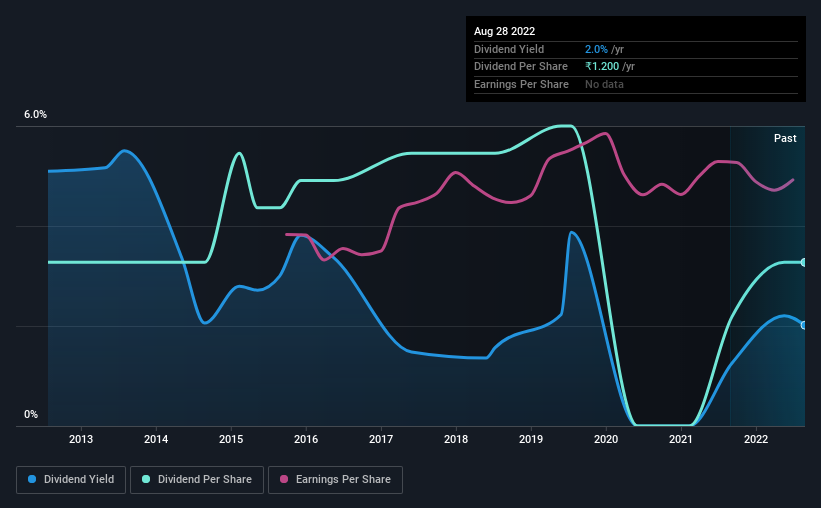- India
- /
- Diversified Financial
- /
- NSEI:TFCILTD
Tourism Finance Corporation of India's (NSE:TFCILTD) Dividend Will Be Increased To ₹1.20

Tourism Finance Corporation of India Limited (NSE:TFCILTD) has announced that it will be increasing its dividend from last year's comparable payment on the 18th of October to ₹1.20. Based on this payment, the dividend yield for the company will be 2.0%, which is fairly typical for the industry.
See our latest analysis for Tourism Finance Corporation of India
Tourism Finance Corporation of India's Dividend Is Well Covered By Earnings
We like a dividend to be consistent over the long term, so checking whether it is sustainable is important. Before making this announcement, Tourism Finance Corporation of India was easily earning enough to cover the dividend. This means that most of what the business earns is being used to help it grow.
If the trend of the last few years continues, EPS will grow by 1.9% over the next 12 months. Assuming the dividend continues along recent trends, we think the payout ratio could be 11% by next year, which is in a pretty sustainable range.

Dividend Volatility
The company has a long dividend track record, but it doesn't look great with cuts in the past. The most recent annual payment of ₹1.20 is about the same as the annual payment 10 years ago. It's encouraging to see some dividend growth, but the dividend has been cut at least once, and the size of the cut would eliminate most of the growth anyway, which makes this less attractive as an income investment.
Tourism Finance Corporation of India May Find It Hard To Grow The Dividend
Growing earnings per share could be a mitigating factor when considering the past fluctuations in the dividend. Although it's important to note that Tourism Finance Corporation of India's earnings per share has basically not grown from where it was five years ago, which could erode the purchasing power of the dividend over time. Earnings growth is slow, but on the plus side, the dividend payout ratio is low and dividends could grow faster than earnings, if the company decides to increase its payout ratio.
An additional note is that the company has been raising capital by issuing stock equal to 12% of shares outstanding in the last 12 months. Regularly doing this can be detrimental - it's hard to grow dividends per share when new shares are regularly being created.
In Summary
Overall, this is a reasonable dividend, and it being raised is an added bonus. The dividend has been at reasonable levels historically, but that hasn't translated into a consistent payment. The dividend looks okay, but there have been some issues in the past, so we would be a little bit cautious.
Companies possessing a stable dividend policy will likely enjoy greater investor interest than those suffering from a more inconsistent approach. At the same time, there are other factors our readers should be conscious of before pouring capital into a stock. Case in point: We've spotted 4 warning signs for Tourism Finance Corporation of India (of which 1 doesn't sit too well with us!) you should know about. If you are a dividend investor, you might also want to look at our curated list of high yield dividend stocks.
Valuation is complex, but we're here to simplify it.
Discover if Tourism Finance Corporation of India might be undervalued or overvalued with our detailed analysis, featuring fair value estimates, potential risks, dividends, insider trades, and its financial condition.
Access Free AnalysisHave feedback on this article? Concerned about the content? Get in touch with us directly. Alternatively, email editorial-team (at) simplywallst.com.
This article by Simply Wall St is general in nature. We provide commentary based on historical data and analyst forecasts only using an unbiased methodology and our articles are not intended to be financial advice. It does not constitute a recommendation to buy or sell any stock, and does not take account of your objectives, or your financial situation. We aim to bring you long-term focused analysis driven by fundamental data. Note that our analysis may not factor in the latest price-sensitive company announcements or qualitative material. Simply Wall St has no position in any stocks mentioned.
About NSEI:TFCILTD
Tourism Finance Corporation of India
A financing institution, provides financial assistance services in India.
Average dividend payer with mediocre balance sheet.
Similar Companies
Market Insights
Community Narratives



